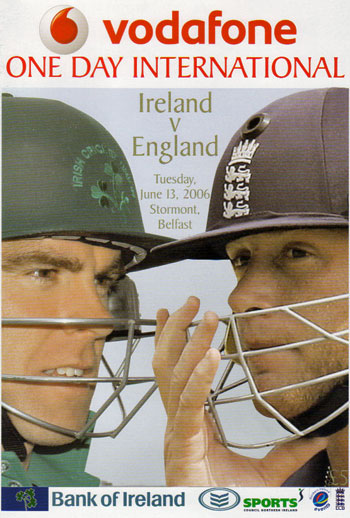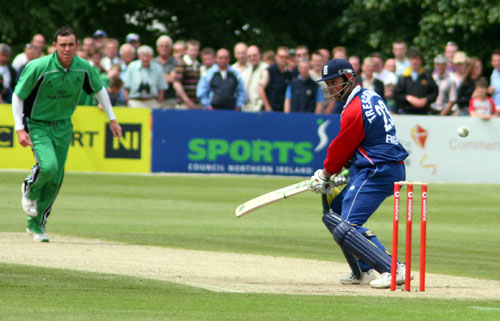


England had a party of 15, newcomers being Bresnan, Dalrymple, Chapple and Ireland's own Ed Joyce, now qualified for England. Of these four only Bresnan did not play against Ireland. Others left out of the party of 15 were Cook, Loudon and Pieterson. It should also be noted that England's captain of the past few years, Vaughan, and his recent deputy, Flintoff, were both injured. Strauss assumed the captaincy.
For Ireland, Botha was now fit again but could not bowl. He came into the team to replace Porterfield who became 12th man. Langford-Smith was recalled in place of Saqlain Mushtaq. Botha was winning his 50th cap. N O'Brien was not released by Kent to play in the match. EJG Morgan was called up by Middlesex to make his county first class debut and following discussions between Middlesex and the Irish Cricket Union it was agreed that Morgan would not be released to play for Ireland.
 Trescothick plays and misses
Trescothick plays and misses
Stormont looked a picture on the morning of the match. The sun shone and a huge crowd, variously estimated at between 6500 and 7500 people, packed into temporary stands. Whichever figure was right, it was the biggest crowd ever to watch cricket in Ireland and would, hopefully, bring financial salvation to the Irish Cricket Union. The English 'Barmy Army' was present in force and entertained with a delightful range of songs accompanied by a trumpeter. The main Irish Cricket Union sponsors, Bank of Ireland, had a large number of guests in a huge marquee. Eshan Mani, President of ICC was present.
 Bell off drives
Bell off drives
This pitch looked a little green when England won the toss and decided to bat. Trescothick and Joyce opened the batting. The England innings could be divided into three parts. In the first 14 overs both teams did well. England scored 92, Trescothick 48, while Ireland dismissed Joyce, Strauss and Collingwood, all cheaply. In the next 28 overs Trescothick and Bell put on 142 runs. In the last eight overs England lost four more wickets for 67 runs. The first four overs saw 21 runs scored, including 10 in extras, and a four to each batsmen. Trescothick took 11 off the first three balls of Johnston's third over. In the fourth over, bowled by Langford-Smith, Joyce hit another four and then got out when he mistimed a pull to square leg. It went very high and O'Brien took a very fine catch which could well have been taken by the wicket-keeper. 37-1-10.
Strauss came in and in a 23 run stand faced only 13 balls and his only scoring stroke was a pulled four. J. Mooney, in the 10th over, replaced Langford-Smith and Trescothick took 11 off his first over. O'Brien came on for the 12th over and his first ball was a long hop which Strauss pulled to Botha at backward square leg. 60-2-4. Collingwood now came in. This stand put on 32 in 23 balls, Collingwood facing 11 of them and scoring 10 runs. Trescothick had a narrow escape in O'Brien's second over when a chance went just wide of a diving gully. Trescothick had reached 48 and wides had gone up to 11 when Collingwood was out in J. Mooney's third over, the 14th. He drove to Johnston at short extra cover who dived to his right for a fine low one-handed catch. 92-3-10. Bell arrived and saw Trescothick to 50 out of 94 in over 15. It had taken him 41 balls and included 10 fours. Bell's first scoring shot was a lucky snick for four in over 16 off J. Mooney. The 16 over score was 106. Then spells by Langford-Smith, P Mooney and McCallan reduced the scoring rate. The 20 over score was 118. Six bowlers were used in the first 23 overs. The half-way score, after 25 overs, was 143. 150 came up in over 27, and 165 in over 30. No four was hit in the stand from over 16 until over 33. Trescothick had reached 80 in over 25, but it was over 35 before he reached 99.
 Glen Chapple appeals for lbw
Glen Chapple appeals for lbw
In the remaining 8.1 overs 67 runs were scored and, in all, seven wickets were taken. Trescothick was J Mooney's second. He took another, Bell, while Langford-Smith took two and these two bowled the last eight overs. Dalrymple came in at number six. 250 was up in over 44 and Bell was out on the first ball of over 46. He chipped to wide short mid-wicket. 258-5-80. Bell does not have the fluency or shot range of Trescothick but his 80 came in 101 balls, but with only four fours. Jones was next but lost Dalrymple in over 47. He pulled a full toss from Langford-Smith high to P Mooney at deep fine leg. 264-6-17. Chapple, the Lancashire fast bowler, aged 32, arrived for his first International innings. In Langford-Smith's next over, the 49, he hit a four and a six to wide long-on off successive balls. Next ball he was out to another fine catch by O'Brien. He ran in from third man, dived forward and took a two-handed catch. 285-7-40. Jones and Plunkett scored 16 off the remaining nine balls. The last ball of all brought up 300 when Jones hit a leg-side half-volley sweetly for four.
 Andrew White is hit by Steve Harmison
Andrew White is hit by Steve Harmison
Harmison started the bowling to Joyce and bowled two wides, each of which went to the boundary. Joyce played on to the third legal ball. 10-1-0. This was Joyce's third successive nought, a hat-trick to go with Bray's hat-trick of run outs earlier in the season. In 57 innings prior to the commencement of this hat-trick, Joyce had complied 5 noughts. The last of these was in 2003 so that there had been a gap of three years since he had last got a "duck" before he started this unfortunate run. With Botha in Chapple shared the bowling with Harmison. Three fours were hit in the first eight overs at which time the score was 43. Plunkett and Mahmood, both fast, came on. Bray hit a four off both but was caught at deep gully in over 12. 60-2-22. McCallan was promoted to number four and joined Botha in a steady stand of 58 in 15 overs. McCallan had originally come into the Irish team as an opening bat, but, prior to this match, since the start of season 2001 has only batted three times as high as number 4, out of 61 innings batted, all three being against M.C.C. when weakened Irish teams were fielded. Both McCallan and Botha hit fours in the last overs of Plunkett and Mahmood, though Botha's off Mahmood was a snick. Collingwood, medium paced, and Dalrymple, off-spin, were the next bowlers. 100 came up in over 22 and McCallan reverse swept Dalrymple for a four in over 24. The 25 over score was 116 and Harmison came back for over 26 after two overs from Dalrymple. The change worked. Harmison's fifth ball nipped away and McCallan was caught at the wicket. 118-3-24.
 Langford-Smith is stumped
Langford-Smith is stumped
John Mooney came in and hit Bell for a six to long-on in the bowler's fifth and last over. His final figures were 2-39. Langford-Smith scored his 12 runs in 11 balls but was out to the last ball of Dalrymple's ninth and last over to give the off-spinner his only wicket. Langford-Smith went down the pitch, missed and was stumped, becoming Jones's third victim. 235-9-9. Paul Mooney joined his brother with four overs remaining. Both did well and the 10th wicket did not fall. The overs were bowled by Plunkett and Harmison and the brothers had a four each in a stand of 28 runs. John Mooney reached 30 from 26 balls with a six and a four. The English fielding was not as good as Ireland's had been. England used seven bowlers. Harmison and Plunkett bowled ten each. Harmison conceded 58 runs and Plunkett 48. Five of the bowlers took wickets with Harmison's three the lion's share. Ireland's batsmen's view was that Harmison was, by far, the best bowler and his three wickets were three of the first six batsmen and he it was who denied any Irish winning hope. Trescothick was named Man-of-the-Match.
